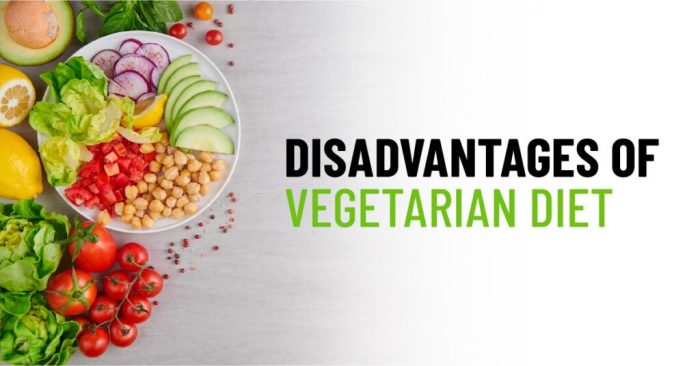Vegetarian diet concerns have sparked a global conversation, raising questions about health, ethics, and sustainability. This comprehensive guide delves into the nuances of vegetarianism, exploring its potential benefits and challenges while providing practical tips for transitioning to a plant-based lifestyle.
Vegetarian Diet Basics

A vegetarian diet is one that excludes meat, fish, and poultry. Some vegetarians also avoid eggs and dairy products, while others may include them in their diet. There are many reasons why people choose to adopt a vegetarian diet, including ethical concerns about the treatment of animals, environmental concerns about the impact of meat production on the planet, and health concerns about the consumption of animal products.
There are many different types of vegetarian diets, including:
- Lacto-vegetarian:This diet includes dairy products but excludes eggs and meat.
- Ovo-vegetarian:This diet includes eggs but excludes dairy products and meat.
- Lacto-ovo vegetarian:This diet includes both dairy products and eggs but excludes meat.
- Vegan:This diet excludes all animal products, including meat, dairy, eggs, and honey.
There are many potential health benefits associated with a vegetarian diet, including a reduced risk of heart disease, stroke, type 2 diabetes, and some types of cancer. Vegetarian diets are also typically high in fiber, vitamins, and minerals, and they can help to maintain a healthy weight.
However, there are also some potential risks associated with a vegetarian diet, including a deficiency of vitamin B12, iron, and calcium. It is important for vegetarians to make sure that they are getting enough of these nutrients from other sources, such as fortified foods or supplements.
Adopting a vegan diet means eliminating all animal products from your plate. This includes meat, poultry, fish, eggs, dairy, and honey. Vegans choose this lifestyle for various reasons, including ethical concerns, environmental sustainability, and health benefits.
Nutritional Concerns

Vegetarian diets offer numerous health benefits, but they also pose certain nutritional challenges. Several essential nutrients may be lacking in plant-based diets, including protein, iron, calcium, and vitamin B12.
Protein
Protein is crucial for building and repairing tissues. Plant-based sources of protein include beans, lentils, tofu, tempeh, and nuts. Combining different plant-based proteins throughout the day can ensure adequate intake.
Iron
Iron is essential for red blood cell production. Plant-based sources of iron include fortified cereals, leafy green vegetables, and beans. Vitamin C enhances iron absorption, so consuming citrus fruits or vegetables with iron-rich foods is recommended.
Calcium
Calcium is necessary for strong bones and teeth. Plant-based sources of calcium include fortified plant milks, leafy green vegetables, and tofu. Calcium absorption is enhanced by vitamin D, which can be obtained through sunlight exposure or fortified foods.
Vitamin B12
Vitamin B12 is essential for nerve function and red blood cell production. Vitamin B12 is not naturally present in plant foods, so supplementation or fortified foods are necessary for vegetarians.
Supplementation
Supplementation may be necessary for vegetarians to ensure adequate intake of certain nutrients, particularly vitamin B12. A healthcare professional can assess individual needs and recommend appropriate supplements.
Ethical Considerations

Adopting a vegetarian diet often stems from ethical concerns about animal welfare and environmental sustainability. Vegetarians believe that animals deserve to be treated with respect and compassion, and they oppose practices such as factory farming, where animals are subjected to inhumane conditions.
Environmental concerns also play a role in vegetarianism. Meat production has a significant impact on the environment, contributing to greenhouse gas emissions, deforestation, and water pollution. By choosing a plant-based diet, vegetarians can reduce their environmental footprint.
For those seeking a plant-based lifestyle, understanding the vegan diet definition is crucial. This dietary approach excludes all animal products, including meat, poultry, fish, dairy, and eggs, focusing solely on plant-based foods.
Challenges and Criticisms, Vegetarian diet concerns
Vegetarians may face challenges in a non-vegetarian society. They may encounter social pressure to consume meat, and they may have difficulty finding vegetarian options when dining out or traveling.
Some critics argue that vegetarianism is not a healthy diet and that it can lead to nutrient deficiencies. However, well-planned vegetarian diets can provide all the nutrients that the body needs.
Practical Considerations
Embracing a vegetarian diet requires thoughtful planning and preparation. Transitioning to a plant-based lifestyle involves practical considerations that ensure a healthy and satisfying experience.
Navigating the practicalities of a vegetarian diet involves meal planning, recipe exploration, dining out strategies, and seeking social support within the vegetarian community.
Transitioning to a Vegetarian Diet
- Start gradually: Gradually reduce meat consumption, incorporating more plant-based meals into your diet.
- Experiment with new recipes: Explore a variety of vegetarian recipes to expand your culinary repertoire and discover new flavors.
- Read food labels: Pay attention to ingredient lists to ensure products are free from animal-derived ingredients.
- Seek professional guidance: Consult with a registered dietitian or healthcare professional for personalized advice and support.
Meal Planning and Recipe Ideas
Meal planning is crucial for a balanced and nutritious vegetarian diet. Consider these tips:
- Include a variety of plant-based proteins: Incorporate beans, lentils, tofu, tempeh, and nuts into your meals.
- Emphasize whole grains: Choose whole-wheat bread, brown rice, quinoa, and oats for fiber and energy.
- Increase fruit and vegetable intake: Aim for at least five servings of fruits and vegetables daily.
- Use herbs and spices: Enhance the flavor of your dishes with a variety of herbs and spices.
Dining Out as a Vegetarian
Dining out as a vegetarian can be challenging, but with preparation, you can navigate restaurant menus with ease:
- Research restaurants beforehand: Check online reviews or call ahead to inquire about vegetarian options.
- Be clear about your dietary restrictions: Inform the server about your vegetarianism and any specific allergies or preferences.
- Explore vegetarian-friendly cuisines: Many cuisines, such as Indian, Thai, and Mediterranean, offer a wide range of vegetarian dishes.
- Ask for modifications: Don’t hesitate to request menu modifications to make dishes vegetarian-friendly.
Social Support and Community Involvement
Connecting with other vegetarians provides support and motivation:
- Join vegetarian groups or online forums: Engage with like-minded individuals to share experiences and tips.
- Attend vegetarian events: Participate in potlucks, cooking classes, or workshops to learn from others and expand your culinary skills.
- Volunteer with vegetarian organizations: Get involved in initiatives that promote plant-based lifestyles and support the vegetarian community.
Outcome Summary
Navigating a vegetarian diet requires a balanced approach, considering nutritional needs, ethical values, and practical considerations. By embracing plant-based alternatives, seeking support from the vegetarian community, and addressing concerns proactively, individuals can reap the benefits of a vegetarian lifestyle while making a positive impact on their health and the environment.
Answers to Common Questions: Vegetarian Diet Concerns
Is a vegetarian diet healthy?
Yes, a well-planned vegetarian diet can provide all the essential nutrients required for good health. However, it’s important to pay attention to protein, iron, calcium, and vitamin B12 intake.
What are the ethical reasons for adopting a vegetarian diet?
Many vegetarians choose this lifestyle out of concern for animal welfare and the environmental impact of animal agriculture.
How can I transition to a vegetarian diet?
Start gradually by reducing meat consumption and incorporating more plant-based meals into your diet. Seek support from online communities or consult a registered dietitian for guidance.